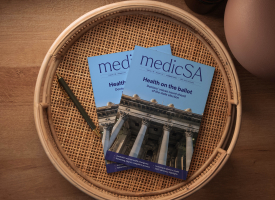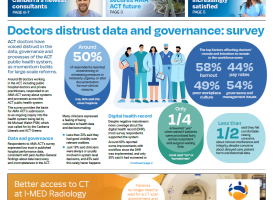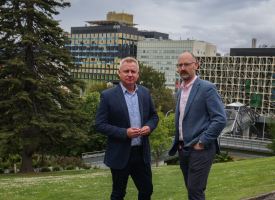Hidden waiting list report launched
Transcript of AMA press conference: 9.30am, 30 September 2022. Carlton Gardens, Melbourne.
With AMA President Prof Steve Robson and AMA Emergency Medicine representative Dr Sarah Whitelaw. Launching report into Australia’s hidden waiting list scandal and providing comment in relation to Covid isolation rules, and GP crisis.
I'm Steve Robson, Federal President of the Australian Medical Association.
I think people around the country are aware of the log jam that our public hospitals are in. We've seen problems like ambulance ramping, costing lives around the country.
We're aware of the enormous delays to planned surgery that are happening in our public hospitals. But what a lot of Australians aren't aware of are what we call the hidden waiting list.
The people who are waiting for elective surgery are waiting because their general practitioners have referred them to specialist clinics at public hospitals. But the delay between seeing your GP, being referred, and actually getting an appointment is blowing out to years for many conditions.
You may think it's not so important but if you're waiting to see an eye specialist and you can't see, it often means you can't work or drive. If you have chronic pain from a condition like endometriosis, it effects your relationships and your ability to work.
If you have knee- arthritis or injuries, then you can't work because you can't get an appointment to see an orthopaedic surgeon has a massive implication on the life of the economy. At the moment, data and information about the number of patients who are waiting and how long they're waiting is incredibly hard to come by.
States and territories are guarding this information and not releasing it. But if we look around the country, there's a total mish-mash of information. The thing that we do know is that in a state like Queensland for example, there is something like a quarter of a million patients waiting for appointments at the hospital outpatient departments.
We have to fix this. In a situation where Australia is recovering from the COVID pandemic, it's still going on, our hospitals are in logjam, and we're facing unprecedented pressures. We are in a situation where patients are waiting and deteriorating.
They're either going back to their general practitioners which is making it more and more difficult to get GP appointments and placing stress on general practitioners around the country or arriving to seek more urgent care as things get worse in an emergency department. So, I'd like to hand you over to Dr Sarah Whitelaw who is an Emergency Medicine Specialist.
SARAH WHITELAW: Thank you. So, we don't know how many hundreds of thousands of patients are on these hidden waiting lists. But what we do know is that while they're waiting, some of them, thousands of them in fact, are becoming so unwell or developing complications that they're having to seek emergency care and needing hospital admissions.
We're seeing it in emergency departments every day. If you're waiting for a specialist outpatient appointment for months and your pain gets worse or complications develop from your chronic illness, GPs and patients often have absolutely no choice but to come up to the emergency department.
Australian emergency departments are continuing to increase. We are so full of hospital inpatients needing beds inside the hospital, but we are dangerously overcrowded.
We can't offload our ambulances when it's not safe to care for their patients in the emergency departments. Our public hospital system urgently needs extra funding, extra capacity, and extra staff. But if we don't work to make specialist outpatients more accessible and to support general practice, we're going to see the numbers increase in our emergency departments and continue to go up and up and up.
We are tired in the emergency department of disaster management. We're tired of resuscitating our patients in waiting rooms and in ambulance corridors. But we're not as tired as our patients are. We share their frustration that so many of them are becoming increasingly unwell, unable to work, their mental health is deteriorating, and their pain is increasing while they're waiting to be put on a waiting list.
There is no state in Australia that doesn't have a hidden waiting list. This is not a state problem. It's an Australian problem. We need a national solution, and we need urgent cooperation, preferably today from our national government and our state governments, to work together to both collect the data so that we know how many people are waiting to be put on waiting lists so we can work out a plan to stop them getting so unwell, or how to manage them when they deteriorate in the meantime. And if we don't have any idea of how many patients are actually waiting to be put on waiting lists, how can we develop a national plan to deal with our elective surgery waiting lists? The coordinated collection of this data and reporting of this data is absolutely urgent and it's never been more urgent than it is now.
STEVE ROBSON: Happy to take any questions that anybody's got.
QUESTION: Can you run us through- there's of key stats that have been put out on the media release. I'm not too sure who best run us through those. But 900 days for a targeted 30-day neurosurgery appointment? That seems a bit unbelievable.
STEVE ROBSON: It's absolutely heartbreaking that people with neurological conditions are waiting 900 days for a condition that they should be seen within a month. This needs action immediately.
QUESTION: What sort of conditions would require an urgent neuro surgeon appointment?
STEVE ROBSON: Many conditions are completely disabling, but are put very low on a priority list. A great example is migraines. Anybody who's had a migraine knows how debilitating it is, but if you can't get specialist care it makes your life almost unliveable at times.
QUESTION: There's a few states on there. Obviously, I sure that there are statistics from each and every state. Is there one that's particularly bad?
STEVE ROBSON: It's incredibly difficult to tell which - sorry. It's incredibly difficult to tell because the data are so mixed up, so poorly recorded, and so impenetrable that we just don't know who's the worst. We understand that these situations are shameful, we can understand why you'd want to hide them, but it's time for the light shine on the situation.
SARAH WHITELAW: There really is no state - yeah, sorry. There really is not state that doesn't have this problem, and I think trying to pick who's doing this the best and who's doing the worst is useful if you're learning from that and we can work together to share solutions. But we don't want to penalise states who are collecting this data and publishing it, but might them look like they've got longer waiting lists than states that aren't collecting the data, or certainly aren't reporting it.
So, it's really important, I think, that we work together to see how big the problem is, but also to work on the solutions. A lot of those solutions are going to come from GP's and hospital teams being able to work together, outpatients is one example of that. But it's that interface between, what do you do when you're a patient with your GP trying to manage your condition and you need other specialist input - how do you get that without having to go through the emergency department?
QUESTION: One of the last lines of the media release talks about [indistinct] funding and a 6.5 per cent cap. Could you talk us through what that would mean and what the cap is?
STEVE ROBSON: If you're going to deal with the enormous number of patients who are on these hidden waiting lists, you need to resource it. At the moment the formula resourcing, health funding is not right and this needs to be changed to a 50/50. We need to scrap the arbitrary cap on expansion each month. We need to put the resources that are needed into the problem and solve it for Australians now.
QUESTION: Can I ask? How much has COVID influenced these numbers?
STEVE ROBSON: These numbers were incredibly large before COVID. To say that this is just a COVID problem or caused only by the pandemic is simply not true. The waiting lists have been a problem for many years and the AMA has been calling for many years for these hidden waiting lists to be reported on and released. There is no doubt that COVID has made things more difficult right across the health care system. Living with COVID means understanding that we need to increase the capacity, the funding, the resourcing, and the staff of our entire health system.
You can see that it's not just one area that's affected - its general practice, it's primary care, it's specialist outpatients, it's elective surgery, and it’s emergency departments and the hospital admission, it's aged care and disability care and rehab. So, the COVID impact on all of the system has flow on effects, but for each other part, if you like.
I think what did happen within the pandemic is that we shifted to telehealth for a lot of our outpatient appointments. We should keep some of that. Some of that works brilliantly for some patients some of the time. But there is no doubt that there was a backlog of people that needed to be seen face to face that weren't able to be. So, yes, COVID will have had an impact on increasing both the human waiting lists and the demand for specialist outpatients in terms of a backlog.
That's not going to go away. It's not a temporary crisis and we need to start looking at long term solutions, not crisis solutions.
QUESTION: Speaking of long-term solutions, National Cabinet's considering scrapping the mandatory isolation stay. I'd love an opinion from both of you, but will that impact your work in any way, shape, or form?
STEVE ROBSON: Living with COVID means that we need to increase the capacity of our health system. And I think we're very interested to see the health advice. Whatever changes we make to our COVID isolation rules or our COVID restrictions in any way, or our COVID management plan is going to mean that we understand that we need to increase the capacity of the health system.
There's no doubt that more COVID circulating puts more, demand on the health system, on all parts of the health system, where there's a very visible face of that and we often see people on the worst day of their lives in the emergency department. So, the impact on their care is really significant.
I think, we obviously need to have a balance of what's best for Australia and it is absolutely imperative that we understand, as Australians, what advice has been given and how our COVID strategy has been developed, and that includes the health advice.
So, I think that's what we'd like to see today is, what is the health advice? How are the strategies being designed and what are we doing about increasing the capacity of our health system to live with COVID, whatever decisions are made today, whatever decisions are made in the future as well.
QUESTION: Can I just as Steven, actually. Steven, is it a good idea? Should we get rid of mandatory ISO now?
STEVE ROBSON: Scrapping mandatory isolation for people who have COVID has the potential to unleash another wave, tip a teetering health system over into crisis again. We need to be extremely cautious, follow the evidence if we're going to make major changes to public health advice like this.
QUESTION: But when we cut it from seven to five days, we haven't seen a dramatic uptick in cases. In fact, they've continued to go down and the amount in hospital at the moment aren't really there for COVID, right? They're there for other issues. So, what's the real risk?
STEVE ROBSON: We're extremely lucky at the moment we're between waves. but we're seeing in the northern hemisphere a massive upswing of COVID cases and hospitals filling up again. We don't want that to happen in Australia as the holiday season approaches so we need extreme caution, and we need to protect the health system and the people who work in it and the patients it serves.
SARAH WHITELAW: I think it's really important to note that COVID has an impact on hospital care. and regardless of what treatment patients need, if we have COVID in our health system it slows things down. It means that we need to take extra precautions, it means that we need to be very, very careful to protect our vulnerable patients from us, the staff, and from other patients in the health system. So it does have an impact, and a rising number of cases in the community will definitely have an impact and a cost on the heath system. And for a health system that's already at breaking point or at full capacity, absolutely we are looking at potential for the increased numbers of COVID cases to rise with trepidation.
QUESTION: Just going back to the waiting lists. You said that many states might not be publishing this data because it could be seen as embarrassing. Could all the states and territories be neglecting this data? Or could it be something else?
SARAH WHITELAW: I think what we would aim for is a uniform national standard of what states should collect, the resources to collect that data and a way to publish that so that it's easily interpretable, and we can use it to develop solutions.
So, it's really difficult at the moment to know what states are collecting and what they're publishing because the way that they're collecting data is often really difficult to compare between them. So, it's hindering us at the moment from developing solutions and sharing knowledge about what does work and what does prevent patients from getting sicker while they're waiting for their elective surgery or their specialist outpatient treatment. And it stops us from developing solutions about how to increase that access and make those times shorter.
Because ultimately, that's what we all want. We want patients to get the treatment they need when they need it and stop that impact of their illness or their injury having on all areas of their life. Whether that means you can't work because you're a landscape gardener and you're waiting for a knee operation, or whether your diabetes is difficult to control and you need some specialist input for that, and not getting it means that you deteriorate to the point where you need hospital admission.
So, it's really about a national plan to give states guidance. And at the moment, it's incredibly difficult to work out who's collecting what when, and what that means when you compare it to other states.
SARAH WHITELAW: So, our public hospitals urgently need increased funding, increased capacity and increased staff. But that takes increased resources. And again, this is not a state specific problem. Every public hospital in metro areas, in regional areas, in rural areas, all across Australia is struggling for resources. It's a national problem and the Federal Government has a responsibility to increase the amount of funding that they put towards our public hospital system and to lift a 6.5 per cent cap that stops the state governments also being able to input the resources into the system that we need them to do.
So absolutely we need to take off that 6.5 per cent cap, increase the Federal Government commitment to 50/50, and we need it now, we need it long term. Blocks of three months of funding don't help hospitals to plan for what their biggest shortage is at the moment, which is staff. We need a commitment to increased funding long term, a 50/50 split between the states and the Federal Government, and a removal of the 6.5 per cent cap.
QUESTION: Do you mind if I ask you as well, Steve? Just finally on GPs?
STEVE ROBSON: Yes.
QUESTION: Next week, they've got a crisis summit largely focused around GPs in Canberra. We know that there's not enough going into or picking it as a speciality.
STEVE ROBSON: General practice in this country is absolutely in crisis at the moment. And one of the major problems is the pipeline to becoming a general practitioner. Only a small number of junior doctors and newly graduated doctors want to become general practitioners. So, we need to make it the most attractive speciality. We need to do it urgently and we need to give the GPs we have now all the tools we can to increase their productivity as much as possible.
QUESTION: The tug of war over public [indistinct] funding [indistinct] Do you see a resolution?
STEVE ROBSON: I missed the last bit.
QUESTION: Do you see a resolution?
STEVE ROBSON: The tug of war between federal and state governments unfortunately has the patients in the middle of that rope, and they're the ones who are under stress. Somebody has to take leadership at the moment. Australia is thirsting for leadership on health resourcing. It has to happen. So, we need Federal and state health ministers and health departments to come to the party urgently.
Ends



